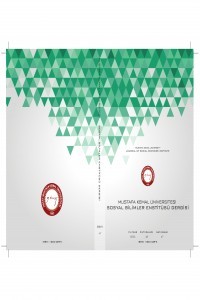İlköğretim Matematik Öğretmen Adaylarının Matematik Öğretimine İlişkin İnançları/ Prospective Elementary Mathematic Teachers' Beliefs About Teaching Mathematics
-
___
- Ajzen, I., Fishbein, M. (1980). Understanding Attitudes and Predicting Social Behaviour. Prentice-Hall, Englewood Cliffs, N.J.
- Ambrose, R. (2004). “Initiating Change in Prospective Elementary School Teachers' Orientations to Mathematics Teaching by Building on Beliefs” Journal of Mathematics Teacher Education, 7, 2, 91-119.
- Bağcı-Kılıç, G. (2001). “Oluşturmacı Fen Öğretimi” Kuram ve Uygulamada Eğitim Bilimleri, 1, 9–22.
- Bandura, A. (1986). Social foundations of thought and action: a social cognitive theory. Prentice-Hall, Englewood Cliffs, N.J.
- Beswick, K. (2005). “The Beliefs/Practice connection in broadly defined contexts” Mathematics Education Research Journal, 17, 2, 39-68.
- Boz, N. (2008). “Turkish Pre-Service Mathematics Teachers' Beliefs about Mathematics Teaching” Australian Journal of Teacher Education, 33, 5, 66-80.
- Boz, Y., Uzuntiryaki, E. (2006). “Turkish Prospective Chemistry Teachers' Beliefs about Chemistry Teaching” International Journal of Science Education, 28, 1647-1667.
- Brown, C., Borko, H. (1992). Becoming a mathematics teacher. In: D. Grouws (Ed.), Hand-book of Research on Mathematics Teaching and Learning (pp. 209–239), New York: Macmillan.
- Brown, C. A., Cooney, T. J. (1982). “Research on teacher education: A philosophical orientation” Journal of Research and Development in Education, 15(4), 13–18.
- Bryan, L. A. (2003). “Nestedness of beliefs: Examining a prospective elementary teacher's belief system about science teaching and learning” Journal of Research in Science Teaching, 40(9), 835–868.
- Handal, B., Herrington, A. (2003). “Mathematics Teachers' Beliefs and Curriculum Reform” Mathematics Education Research Journal, 15(1), 59-69.
- Irez, S. (2007). “Reflection-Oriented Qualitative Approach in Beliefs Research” Eurasia Journal of Mathematics, Science & Technology Education, 3(1), 17-27.
- Kagan, D.M. (1992). “Implications of research on teacher belief” Educational Psychologist, 27, 65–90.
- Lemberger, J., Hewson, P.W., Park, H. J. (1999). “Relationships between prospective secondary teachers` classroom practice and their conceptions of biology and of teaching science” Science Education, 88, 347-371.
- Levitt, K. E. (2001). “An analysis of elementary teachers' beliefs regarding the teaching and learning of science” Science Education, 86, 1–22.
- Lumpe, A. T., Haney, J. J., Czerniak, C. M. (2000). “Assessing teachers' beliefs about their science teaching context” Journal of Research in Science Teaching, 37(3), 275–292.
- Markic, S., Eilks, I. (2008). “Developing a Tool to Evaluate Differences in Beliefs About Science Teaching and Learning Among Freshman Science Student Teachers from Different Science Teaching Domains: A Case Study” Eurasia Journal of Mathematics, Science & Technology Education, 4(2), 109-120.
- Nespor, J. (1987). “The role of beliefs in the practice of teaching” Journal of Curriculum Studies, 19(4), 317–328.
- Pajares, M. F. (1992). “Teachers' beliefs and educational research: Cleaning up a messy construct” Review of Educational Research, 62(3), 307–332.
- Sigel, I. E. (1985) Parental belief systems. Hillside, NJ: Erlbaum.
- Tsai, C. (2002). “Nested epistemologies: Science teachers' beliefs of teaching, learning and science” International Journal of Science Education, 24(8), 771–783
- Uzuntiryaki, E., Boz, Y. (2007). “Turkish Pre-Service Teachers' Beliefs About The Importance Of Teaching Chemistry” Australian Journal of Education, 32, 1-16.
- Uzuntiryaki, E., Boz, Y., Kirbulut, D., Bektas, O. (2010). “Do Pre-service Chemistry Teachers Reflect their Beliefs about Constructivism in their Teaching Practices?” Research in Science Education, 40:403–424
- Wallace, C. S., Kang, N. (2004). “An investigation of experienced secondary science teachers' beliefs about inquiry: An explanation of competing belief sets” Journal of Research in Science Teaching, 41(9), 936–960.
- Yurdakul, B. (2007). Yapılandırmacılık (Constructivism). Ö. Demirel (Ed.), Eğitimde Yeni Yönelimler (s. 39-65) Ankara: Pegem A Yayıncılık.
- Başlangıç: 2004
- Yayıncı: Hatay Mustafa Kemal Üniversitesi
Cengiz ÖZMEN, Harun ER, Fitnat GÜRGİL
Türkiye'de Kırsal Göçün Aile Üzerine Etkisi/ The Effect On Famıly Of Rural Mıgratıon In Turkey
Mehmet BULUT, Neslihan BULUT, Aykut BULUT
Mehmet GÖMLEKSİZ, Hasan KILINÇ
Meslek İdealleri ve Girişimcilik Niyetleri/Professıonal Ideals And Entrepreneurıal Intentıons
